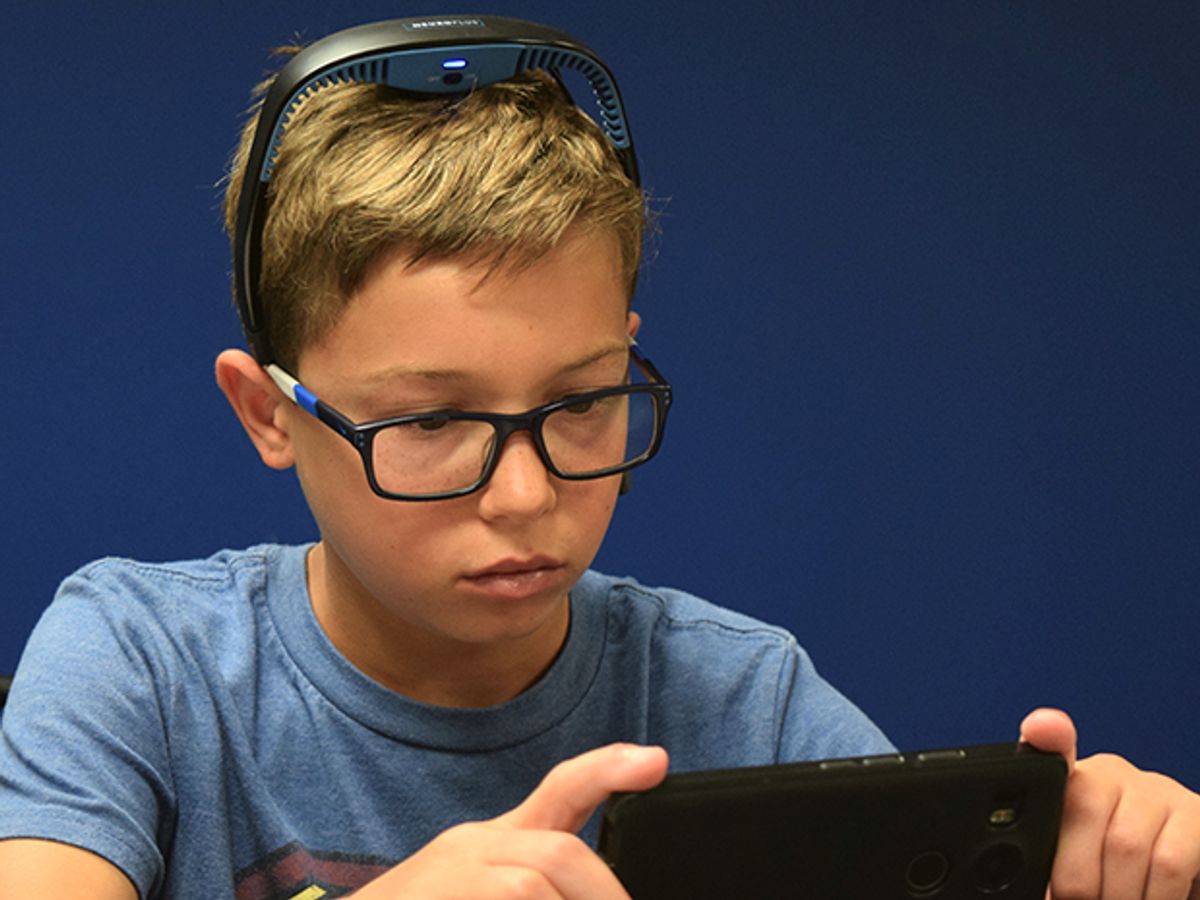Some people unfairly blame video games for the seeming proliferation of kids today with attention deficit hyperactivity disorder (ADHD). But the startup NeuroPlus hopes to convince people that its brain-controlled games can actually improve ADHD symptoms in kids. In a pilot study, kids with ADHD showed better focus and attention after 10 weeks of playing the games while wearing a brain-sensing headset.
Brain-training games have gotten a bad reputation recently. One market leader, Luminosity, was fined in 2016 for making misleading marketing claims, and scientists have conducted studies showing that its cognitive-improvement games don’t work. But NeuroPlus CEO Jake Stauch says his company is different. “We did this study because we’re an evidence-based company,” he says. “We don’t want to be a fly-by-night company selling snake oil.”
The pilot study was conducted using an EEG-reading headset that’s already on the market (the Muse headband), but NeuroPlus has developed its own headset for sale with its finished system. Stauch says the company already has a working prototype of the headset, and just launched a Kickstarter campaign to raise funds for manufacturing.
To play one of the NeuroPlus games, a user controls some of the action via standard touchscreen commands on a phone or tablet. But the user’s neural activity also brings an element of control: In a dragon-racing game, for example, a brain signal associated with focus and concentration speeds up the player’s avatar.
The NeuroPlus headset, which sells for $249, has one flexible EEG sensor that presses against the wearer’s scalp. EEG is a very broad and generalized signal of brain activity generated when thousands of brain cells act in concert; the sum of their activity creates rhythmic electrical pulses known as brainwaves.
“We’re really excited to get this headset out there,” Stauch says. “We think it’s the best one of the market.” While existing headsets like the Muse provide the necessary EEG data, Stauch says the new NeuroPlus headset is customized for the ADHD application. The NeuroPlus system is intended for use by anyone who wants to improve their focus and attention, but Stauch says he expects many NeuroPlus users to be kids, and standard EEG headsets wouldn’t fit their small heads.
The NeuroPlus system measures a variety of EEG signals, including the ratio between fast beta waves and slower theta waves, which has been shown to be a good indicator of attention control. (Another use of this beta-theta ratio is an FDA-cleared diagnostic test for ADHD called Neba.) The NeuroPlus system uses this indicator to improve performance in the game, and that “neurofeedback” teaches the user to produce these brain signals more reliably.
The new NeuroPlus headset’s single electrode has rubbery protrusions that go through the user’s hair to reach the scalp. It’s situated at the top of the head, Stauch says, because in that location the sensor picks up very clean EEG signals; other locations on the forehead or scalp pick up lots of electric signals from the muscles of the face and head.
While EEG systems used in neuroscience research can place up to 256 electrodes on a person’s scalp, such refined measurements aren’t necessary for simple gaming controls, Stauch says. “If we were doing brain mapping research, one sensor wouldn’t cut it,” he says. “But if you already know the signal you want to find, one sensor is fine. It can detect whether or not that signal is present.”
In the pilot study of the NeuroPlus tech, 60 kids with ADHD were randomly divided into two groups. One group continued their normal treatment of medication and therapy, while the second group continued normal treatment and also played a NeuroPlus game three times per week while wearing the Muse headset. After 10 weeks, the kids who played the game had significantly better scores on assessments of their attention, hyperactivity, and impulsivity.
The researchers first measured results by the Connors behavior rating scale, a commonly used ADHD assessment that the kids’ parents filled out before and after the 10-week treatment period. They also used a computerized assessment called the Quotient ADHD system to provide objective data regarding the kids’ micromovements and cognitive performance.
The study was conducted in cooperation with Sandeep Vaishnavi, a neuropsychiatrist at Duke University and director of the neuropsychiatric clinic at Carolina Partners in Mental Healthcare. Vaishnavi presented the results at the World Congress on ADHD earlier this year, and is submitting a paper for publication in a peer-reviewed journal.
Stauch says the next research step will be a larger study in 2018 in which half the kids will play a NeuroPlus game that’s responding to the commands from their NeuroPlus headset, while the sham control group will play the same game and wears the same headset—but it won’t be transmitting any commands.
NeuroPlus has not applied for FDA clearance for its headset and game system, so the company can’t market it as an official medical treatment for ADHD. Instead, it’s considered a device for general wellness. “We’re focused on getting this product out there for everyone who wants to improve their ability to pay attention,” Stauch says. But the results of the pilot study make applying for FDA approval “an interesting possibility down the line,” he says.
This post was corrected on September 27 to reflect that the pilot study was conducted using a Muse headset, not the NeuroPlus headset.
Eliza Strickland is a senior editor at IEEE Spectrum, where she covers AI, biomedical engineering, and other topics. She holds a master’s degree in journalism from Columbia University.






